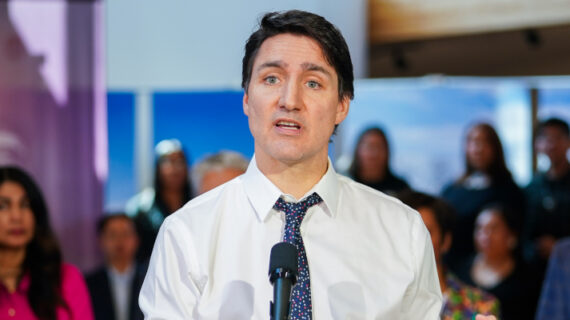A striking scene took place last Friday—one that doesn’t typically generate much buzz for being an out-of-the-ordinary occurrence: a Canadian conservative addressing a chamber of commerce. But speaking with the Greater Vancouver Chamber of Commerce, Pierre Poilievre admitted that this was the first chamber of commerce or board of trade that he has met with since becoming the Conservative Party leader 18 months ago. In contrast, he said that he has visited five local union halls and 110 “shop floors” in that time.
His message matched the overall tone he has adopted towards big business in his time as leader—which is to say he was not afraid to mince words in criticizing “utterly useless” corporate lobbyists and the business leaders who fail to stand up for workers.
Rather, he claimed that if he becomes prime minister his “daily obsession” will be to advance the interests of the “working-class” people of this country.
What is behind the strident rhetoric? And does this signal a fundamental shift in the Conservative Party’s adherence to free-market principles?

To answer the first question first, astute political observers have recently homed in on the dismal state of Canada’s GDP per capita. They rightly point out that the powerful statistic is one of the best measures of how individuals and families are experiencing the economy. And as far as it goes, things aren’t looking good. As Pierre Poilievre might put it, people don’t just need jobs, they need powerful paycheques. And when the cost of living is rising as the economy falters, Canadians’ paycheques are feeling…weak.
But as prognosticators begin to chart out what the potential future prime minister would do about the economy, this focus by him and many of his new candidates on cost-of-living—sometimes pejoratively described as economic populism—is leading many to worry that when it comes to governing, he’ll put sloganeering before sound economic principles. They’re concerned he’ll sacrifice solid financial management at the altar of political pandering, avoiding unpopular decisions and attacking, maybe even penalising, the very drivers of economic growth.
It’s true that Poilievre’s economic policy is likely to be influenced by recent global trends and new externalities—from the rise of China as a bad-faith trading partner to the impact of new technologies on work and culture. And there’s no question that Poilievre’s campaign messaging isn’t especially friendly to the corporate class. But a plan that isn’t tied to real people’s experience of the economy is worthless.
Poilievre and his team are responding to almost a decade of political decision-making that saw workers with weakening paycheques and consumers with rising costs play second fiddle to virtue signalling global climate deals, and climbing taxes, regulations, and winner-picking corporate welfare. For them, fighting for workers means restoring the conditions in which free enterprise can flourish by restoring the baseline conditions for fair dealing. Poilievre may campaign like an economic populist, but when it comes down to it, he’ll govern like a modern fiscal conservative.
It’s hard to blame Canada’s business community for feeling trepidatious about what’s to come. More than a year into his leadership, Poilievre made sure to remind Bay Street executives at a C.D. Howe lunch that he wasn’t all that interested in spending his time meeting with them. Just last week his newest star member of Parliament, Jamil Jivani, took the opportunity in his victory speech to warn “liberal elites” in business to get their priorities straight and worry less about DEI and more about their workers.
It’s not that this commentary is mere rhetoric. Indeed, Poilievre and Jivani are quite serious about the priorities they’re setting. But rather than assuming a focus on these themes will lead to economic interventionism, it’s worth thinking through what underpins them.
Conservatives know that for wages to go up and prices to go down or stop growing so fast (in other words, to get at that pesky GDP-per-capita problem), our economy needs to grow—especially if our population continues to grow. Left-wing populists may believe the best way to make one person’s piece of the pie bigger is to make another’s smaller, but conservatives—even pro-worker conservatives—understand that the better approach is to make the pie bigger. To make matters more complicated, much of what anemic growth we have had in Canada has been a result of our housing bubble, which Poilievre and his team are planning to help deflate.
Finally, the Conservatives want to “fix the budget.” It’s the third of their top four priorities if you assume their slogans are indicative. And while any meaningful path to balance will include finding savings, more importantly, it will involve driving revenue through economic growth, which, for a frequent Milton Friedman quoter, is going to have to come from lower taxes and deregulation. In other words, Poilievre won’t be able to achieve the Canada that he wants for workers and consumers without growth-oriented, traditionally pro-business policies.
There will no doubt be instances—like weighing whether to approve a merger or takeover or deciding whether to legislate workers back to their jobs—where free market principles will have to be weighed against competing common goods like national security or labour rights. And of course, if a company’s idea of pro-business policy is for the government to preserve protected regulatory status, tax treatment, or a funding envelope, then that is an argument for crony capitalism, not a growth agenda. Business leaders may need to come to terms with not being the heroes of a potential Poilievre government’s economic story.
After all, prioritizing the interests of a small elite is part of how our country got into this mess. But casual watchers should not mistake Poilievre’s distaste for corporate Canada’s trendier priorities with a fundamental discomfort with free market capitalism. In fact, it’s the opposite. For Poilievre, fiscal conservatism and economic populism aren’t incompatible, they’re a match made in heaven.




